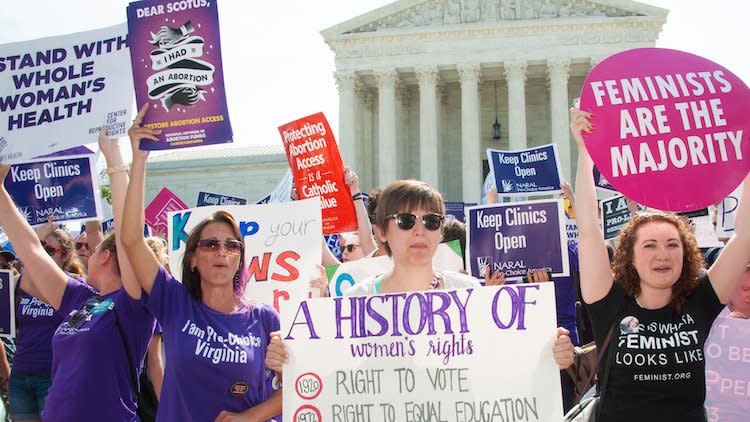After Losing Roe v. Wade, How to Fight Back

While the overturning of Roe v. Wade will move many of us to despair — and rightly so — there are actions to take to fight back.
Given that about half the states in the nation are poised to ban abortion, people seeking abortions and other forms of reproductive health care may have to travel out of state or even outside the U.S. to undergo procedures. To help those who have trouble paying for the treatment or travel, you can donate to an abortion fund. Find a list of them at the National Network of Abortion Funds.
Also, consider donating to your local clinic or Planned Parenthood. Planned Parenthood clinics usually provide a wide range of health services, including contraception, prenatal care, cancer screenings, hormone treatment for gender transition, and HIV testing, treatment, and prevention options. It’s important to keep these services available. And in states where abortion is likely to remain legal, clinics that offer the procedure are expecting an influx of out-of-state clients.
Consider donations as well to other organizations that fight for reproductive rights, such as NARAL Pro-Choice America, the National Organization for Women, and the American Civil Liberties Union. If you don’t have the resources to donate, consider volunteering your time.
Related — Check out more of the Advocate’s news coverage on Pride Today:
Donate or volunteer for candidates who support reproductive freedom. There’s a chance that Congress could pass legislation legalizing abortion nationwide — it’s a rather slim chance, but possible if Democrats have substantial majorities in both the U.S. House and Senate. And fighting for abortion rights and other bodily autonomy rights at the state level will now be more important than ever.
You can find candidates at Vote Prochoice, NARAL, Planned Parenthood Action Fund, Emily’s List, LPAC, the Human Rights Campaign, the LGBTQ Victory Fund, and various arms of the Democratic Party, including the Democratic Legislative Campaign Committee (state legislatures), Democratic Congressional Campaign Committee (U.S. House), and Democratic Senatorial Campaign Committee (U.S. Senate). Most Democrats support abortion rights, although not all — the Democratic governor of Louisiana, John Bel Edwards, signed an abortion ban into law, set to go into effect with the overturning of Roe. So research candidates’ positions on the issue. And remember that support for reproductive rights usually goes hand in hand with support for LGBTQ+ equality.
Most of all, stay informed, make sure you’re registered to vote, and cast your ballot for candidates who represent your interests.

